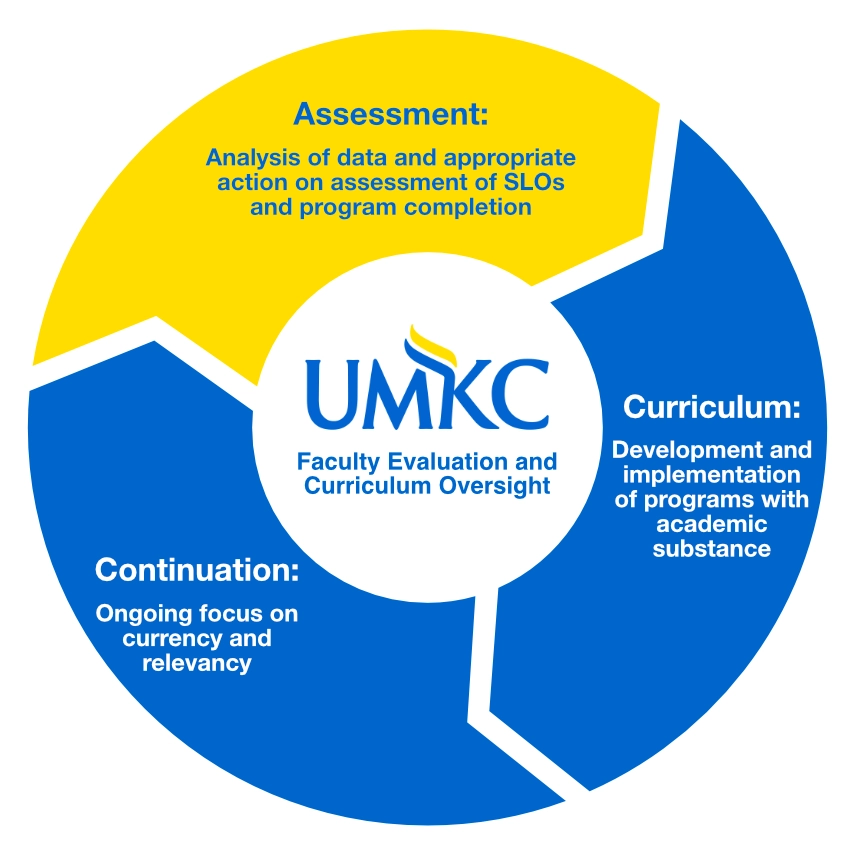Assessment
Assessment provides ongoing program and instructional improvements that enhance the student learning experience. With reliable data, we can measure whether our students are achieving the learning outcomes we set and whether our methods are contributing to or detracting from that achievement.
Assessment addresses three fundamental questions about student learning achievement:
- What have our students learned?
- Are we satisfied with what they have learned?
- If not, what are we going to do about it?
Assessment as Part of Quality Assurance
Student learning assessment is one piece of our recursive, progressive model of academic improvement. At UMKC, each phase of the quality assurance process informs the next, ensuring quality outcomes.

Assessment Encourages Effectiveness
Assessment enables us to communicate the effectiveness of our educational and co-curricular programs to a variety of stakeholders and to use resources wisely in carrying out the mission and goals of the university. Assessment facilitates these functions by providing a basis for communicating our achievements to our constituents in an objective and accountable fashion and informing strategic planning and resource allocation decisions.
University Assessment Committee
The University Assessment Committee (UAC) encourages, supports and guides the growth of effective assessment practices of student learning outcomes at UMKC. The UAC recommends policies related to assessment of student learning, develops the framework for assessment of academic and co-curricular programs, and assists in the developing and monitoring assessment of UMKC Essentials, our general education program.
The UAC reviews program-level assessment plans for all academic programs and provides recommendations for plan improvements to department chairs, program directors and departmental assessment coordinators. The UAC also assists in developing, monitoring and revising the university plan for assessing general education learning outcomes.
Program Assessment
The University has implemented two assessment protocols to ensure programs maintain the highest quality and enhance the student experience. Learn more about these processes or reach out to Vice Provost for Curriculum and Instruction, Kim McNeley, with questions.
Annual program review
Student learning assessment is conducted and archived annually by each program to evaluate student learning outcomes (SLOs).
Learn about the annual review process
Five-year program review
This cyclical assessment process is conducted by every program to evaluate program efficiency and helps ensure that our educational offerings meet academic goals established by the University.
General Education Assessment
In the general education program, student achievement of the student learning outcomes is evaluated through direct and indirect measures. Our general education program, UMKC Essentials, is designed to provide knowledge and skills that are important for all students, including critical thinking, oral communication, written communication, quantitative literacy, civic and community engagement and culture and diversity.
Assessment for the General Education Program, is conducted by the General Education Executive Committee.
Explore general education resources
Direct assessment
Direct assessment efforts are coordinated by the University Assessment Committee, Office of Assessment, general education administrator and general education faculty and include yearly course-embedded assessments and standardized instruments.
Course-embedded assessment
Students are given signature assignments designed to elicit general education student learning outcomes. Representative samples of students' signature work are drawn each year and trained faculty panels review these assignments to evaluate achievement of the identified learning outcomes. Results of the reviews are aggregated by the Office of Assessment and used by faculty to inform programmatic improvements designed to enhance student learning achievement.
Review General Education Assessment Reports
Exit Exam
Graduating seniors take an exit exam that measures student achievement in thinking, qualitative analysis, written communication, civic competency and engagement, and intercultural competency and diversity. The exam is a standardized exam developed by ETS.
Indirect evaluation
UMKC also employs indirect measures to evaluate how students perceive their achievement of general education learning outcomes. These measures include the National Survey of Student Engagement and the Senior Survey. Both surveys are administered by the Office of University Planning and Institutional Effectiveness. The office reports the results to support institutional decision making.
Assessment Contacts and Resources
John Barton, Faculty Lead for Assessment
Mike Cadden, Curriculum, Assessment and Articulation Specialist